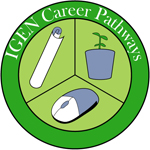By Terri Berryman, Project Director, IGEN Career Pathways, College of Lake County
(This article appears in the December, 2012 issue of The ACUPCC Implementer)
Illinois Green Economy Network (IGEN), which was formed in 2006, is a President led initiative involving all 48 community colleges in the state of Illinois. IGEN has four main areas of focus – green campus, green communities, green curriculum and green careers. In 2011, the College of Lake County, on behalf of the IGEN, was awarded a $19.37 million grant from the Department of Labor (DOL) as part of round one of the Trade Adjustment Act Community College Career Training (TAACCCT) grant program. The grant, IGEN Career Pathways, brings together seventeen community colleges working as a consortium to create 31 on-line blended and hybrid degree and certificate programs in green career fields.
 The grant’s goals are aligned with the four priorities outlined by the DOL: to accelerate progress for low-skilled and other workers; to improve retention and achievement rates to reduce time to completion; to build programs that meet industry needs, including pathways; and to strengthen online and technology-enabled learning. Seven strategies are being used to meet these priorities:
The grant’s goals are aligned with the four priorities outlined by the DOL: to accelerate progress for low-skilled and other workers; to improve retention and achievement rates to reduce time to completion; to build programs that meet industry needs, including pathways; and to strengthen online and technology-enabled learning. Seven strategies are being used to meet these priorities:
- Create and deploy transition services to prepare low skilled adults for career opportunities;
- Retain students through communications until career placement;
- Accelerate program completion time through embedding general education outcomes;
- Provide new or redesigned blended online green career certificate and associate degree programs;
- Provide on-line entrepreneurship training, integrating green economy skills as needed;
- Offer a continuum of completion by stacking certificates and degrees and articulating to a Bachelor’s;
- Develop, evaluate, and disseminate a green careers online, technology-enabled adult learning system for TAA and other workers.
The project is leveraging the NTER Learning Management System that was created for the Department of Energy. The system has been customized to provide a platform for blended on-line learning for instructor led classes. A critical feature of the system is use of 3D modeling for learning which enables faculty to animate 3D objects to meet course objectives. Because the course content is open-source, any college in the country will have access to the course content including images and models.
Creating academic programs that lead to job opportunities is a major focus of the TAA grant, in order to make it easier for displaced workers to learn new job skills and train for new green careers. The grant targets five industries – STEM, Advancing Manufacturing, Architecture and Construction, Agriculture and Natural Resources, and Transportation. Programs include a wide-range of career fields such as local foods, sustainable agriculture, green buildings management, weatherization, automotive recycling, solid waste, wind turbine technician, and many more. By the end of the three-year grant period, the 17 participating colleges will create 193 courses in sustainability-related fields and provide instruction to 2,000 students.
A key piece of the grant is the creation of Adult Transition Services on five of the partner college campus. This effort is designed to help low-skilled adults access the services they need to prepare for college coursework. The five colleges are working together to create a referral network of services needed to assist these adults, such as skills brush-up, test taking, career assessment, and success planning. Once in place, these referral networks will allow dislocated workers and other adults with a head start on their college careers.
Another strategy being used to accelerate progress and improve retention is embedding general education courses into career programs. These courses are being developed jointly with general education and career instructors. The first such course to be offered will be a joint HVAC and technical writing course. Students enrolling in this course will receive 3 credits in HVAC and 3 credits in technical writing. This allows for a compressed time frame for the Associate of Applied Science degree and for contextualized content designed to retain students through completion.
In the final phase of the grant all of the information and course content will be shared with all 48 community colleges in Illinois. IGEN Career Pathways is an exciting project designed to take Illinois community colleges to the next level in their greening of careers efforts.
